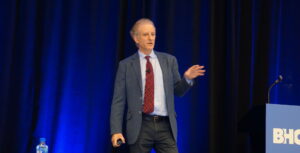
Prominent economist Todd Buchholz does not expect a major recession to strike but is worried that the shortage of workers, political polarization and deficit spending are hampering long-term growth prospects.
The economy will worsen as gas prices remain high, Buchholz said, speaking Oct. 4 during the Bank Holding Company Association’s fall seminar in Edina, Minn. He predicted that annual Christmas spending will fall this year as inflation remains a pressing issue and gas prices are high. CPI Inflation was measured at 3.7 percent in August, higher than its 3 percent reading the previous month, but much lower than its peak of 8.9 percent in June 2022.
The Federal Reserve kept its benchmark interest rate at 5.25 to 5.50 percent in September, its second hold in three months. The pause was seen as a sign that the Fed is moderating its fight against inflation amid easing price pressures. The Fed has not lowered its benchmark interest rate since tightening began last year.
Buchholz, director of economic policy under President George H.W. Bush, attributed the Fed’s continued tight policy to Chair Jerome Powell’s desire to avoid the fate of Arthur Burns, Fed chair from 1970-1978. Burns has been blamed for failing to follow through on his initial tightening of credit to control inflation during the decade, leading to 14 percent inflation in 1980.
He placed much of the blame for inflation on the $3 trillion of quantitative easing approved by the Federal Government during the pandemic. He criticized Economist Robert Reich and Sen. Elizabeth Warren (D-Mass.) for blaming inflation on corporate greed, instead attributing the rise in prices to stimulus dollars flooding the market from former President Donald Trump and current President Joe Biden.
To Buchholz, the federal government misdiagnosed the economy as being in a recession during the pandemic, instead of realizing that it reflected shifting spending habits as more people stayed home amid widespread shutdowns. He noted that the economy rapidly recovered once the first COVID-19 vaccine became available in late 2020.
Buchholz criticized regulations and the recent pushback to free trade agreements. He said the gig economy, which helped keep inflation down in the 2000s, is now being curtailed by overzealous regulators. New York City recently passed a law requiring short-term rental hosts looking to obtain a license to register with the Office of Special Enforcement. Since then, the use of short-term rentals has fallen drastically in the city while the use of hotel rooms has risen.
Buchholz expects that oil prices, which have reached $89 per barrel, will fall to between $60 and $80 per barrel a year from now. He criticized the Biden administration for cutting the production of domestic oil while authorizing Chevron to increase production in Venezuela and allowing for the resumption of Venezuelan oil exports
A critic of political polarization, Buchholz said the pessimism Republicans and Democrats share for free trade has caused economic challenges and provoked retaliation from historical allies such as Canada. In 2020, Canada announced $2.7 billion of retaliatory tariffs on United States-made goods in response to Trump’s decision to reimpose 10 percent aluminum duties on the country. Though Buchholz said close scrutiny is needed in trading with historical foes such as China, Russia and North Korea, the United States needs to be a more welcoming trading partner with its allies.
